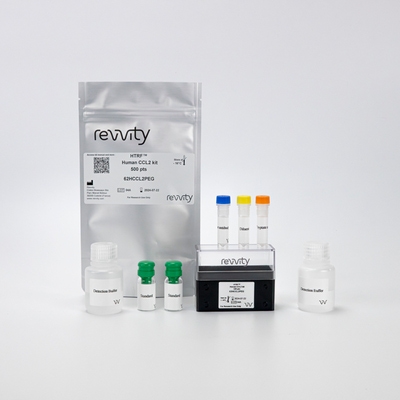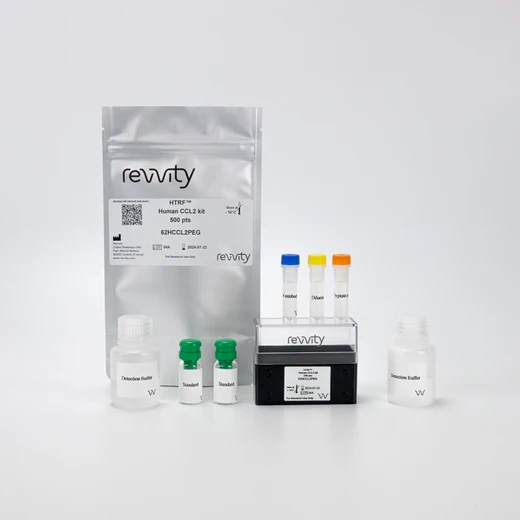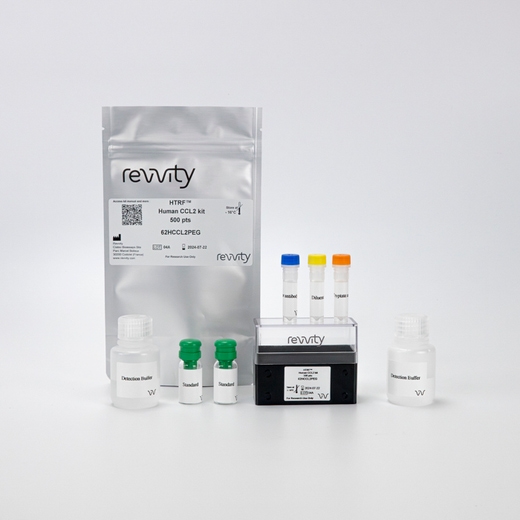

HTRF Human CCL2 Detection Kit, 500 Assay Points


HTRF Human CCL2 Detection Kit, 500 Assay Points






The HTRF human CCL2 (MCP1) kit is designed for the quantification of human CCL2 release in cell supernatant.
| Feature | Specification |
|---|---|
| Application | Protein Quantification |
| Sample Volume | 16 µL |
The HTRF human CCL2 (MCP1) kit is designed for the quantification of human CCL2 release in cell supernatant.



HTRF Human CCL2 Detection Kit, 500 Assay Points



HTRF Human CCL2 Detection Kit, 500 Assay Points



Product information
Overview
Also called MCP-1 (monocyte chemoattractant protein 1), CCL2 is a chemokine mainly secreted by monocytes, macrophages, and dendritic cells to attract monocytes, basophils, and T cells. CCL2 is involved in pathologies like psoriasis or arosclerosis. In brain, CCL2 is released by neurons, astrocytes, and microglia, and is part of neuro-inflammatory response observed in ischemia or Alzheimer's disease. CCL2 is also secreted by adipocytes and can interfere with insulin signaling, thus suggesting a role in inflammation linked to diabetes.
Assessment of serum samples often requires enhanced sensitivity. In some cases, AlphaLISA assays may have sufficient sensitivity to enable detection of low levels of analytes in serum or plasma.
Specifications
| Application |
Protein Quantification
|
|---|---|
| Brand |
HTRF
|
| Detection Modality |
HTRF
|
| Product Group |
Kit
|
| Sample Volume |
16 µL
|
| Shipping Conditions |
Shipped in Dry Ice
|
| Target Class |
Cytokines
|
| Target Species |
Human
|
| Technology |
TR-FRET
|
| Therapeutic Area |
Metabolism/Diabetes
NASH/Fibrosis
Oncology & Inflammation
|
| Unit Size |
500 Assay Points
|
Video gallery

HTRF Human CCL2 Detection Kit, 500 Assay Points

HTRF Human CCL2 Detection Kit, 500 Assay Points

Citations
How it works
Assay principle
Cell supernatant, sample, or standard is dispensed directly into the assay plate for the detection by HTRF® reagents (384-well low-volume white plate or Revvity low-volume 96-well plate in 20 µl). The antibodies labeled with the HTRF donor and acceptor are pre-mixed and added in a single dispensing step, to further streamline the assay procedure. The assay can be run up to a 1536-well format by simply resizing each addition volume proportionally.

Assay data analysis
The 4 Parameter Logistic (4PL) curve is commonly recommended for fitting an ELISA standard curve. This regression enables the accurate measurement of an unknown sample across a wider range of concentrations than linear analysis, making it ideally suited to the analysis of biological systems like cytokine releases.
Revvity also worked with Myassays.com to help you in your data analysis.
Assay details
Technical specifications of human CCL2 kit
| Sample | 16 µL |
|---|---|
| Final assay volume | 20 µL |
| Kit components | Lyophilized standard, frozen detection antibodies, buffers & protocol. |
| LOD & LOQ (in Diluent) | 20 pg/mL & 90 pg/mL |
| Range | 90 - 3,000pg/mL |
| Time to result | ON at RT |
| Calibration | NIBSC (92/794) value (IU/mL) = 0,9 x HTRF hCCL2 value (pg/mL) |
| LOD & LOQ (in Diluent) | 20 pg/mL & 90 pg/mL |
| Species | Human only |
Analytical performance
Intra and inter assay
| Sample | Mean [CCL2] (pg/mL) | CV |
|---|---|---|
| 1 | 100 | 10% |
| 2 | 1500 | 7% |
| 3 | 2750 | 7% |
| 8% |
Each of the 3 samples was measured 24 times, and % CV was calculated for each sample.
Inter assay (n=4)
| Sample | [CCL2] (pg/mL) | Mean (delta R) | CV |
|---|---|---|---|
| 1 | 121 | 335 | 2% |
| 2 | 437 | 1096 | 3% |
| 3 | 1579 | 3030 | 2% |
| Mean CV | 2% |
Each of the samples was measured in 4 different experiments, and % CV was calculated for each sample.
Resources
Are you looking for resources, click on the resource type to explore further.
Chimeric antigen receptor (CAR) T-cell therapy has transformed the field of immuno-oncology providing a novel approach to treating...


How can we help you?
We are here to answer your questions.






























